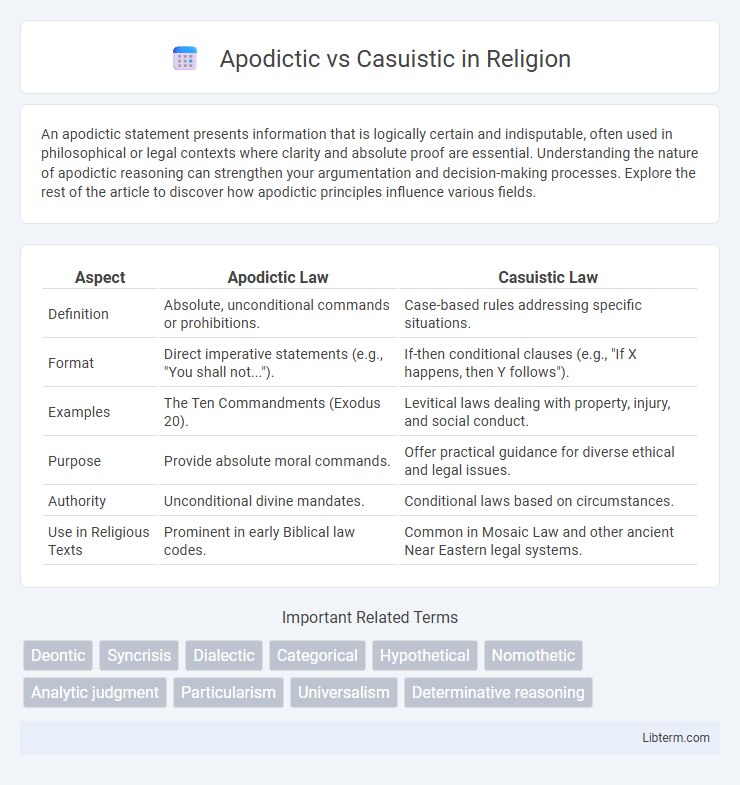An apodictic statement presents information that is logically certain and indisputable, often used in philosophical or legal contexts where clarity and absolute proof are essential. Understanding the nature of apodictic reasoning can strengthen your argumentation and decision-making processes. Explore the rest of the article to discover how apodictic principles influence various fields.
Table of Comparison
| Aspect | Apodictic Law | Casuistic Law |
|---|---|---|
| Definition | Absolute, unconditional commands or prohibitions. | Case-based rules addressing specific situations. |
| Format | Direct imperative statements (e.g., "You shall not..."). | If-then conditional clauses (e.g., "If X happens, then Y follows"). |
| Examples | The Ten Commandments (Exodus 20). | Levitical laws dealing with property, injury, and social conduct. |
| Purpose | Provide absolute moral commands. | Offer practical guidance for diverse ethical and legal issues. |
| Authority | Unconditional divine mandates. | Conditional laws based on circumstances. |
| Use in Religious Texts | Prominent in early Biblical law codes. | Common in Mosaic Law and other ancient Near Eastern legal systems. |
Defining Apodictic and Casuistic Reasoning
Apodictic reasoning involves absolute, universally valid statements that are logically necessary and incontrovertible, often found in deductive logic and moral laws. Casuistic reasoning focuses on case-based, conditional judgments derived from specific situations, emphasizing practical application and exceptions rather than universal absolutes. The distinction highlights apodictic's reliance on categorical certainty versus casuistic's contextual, conditional nature in ethical and legal reasoning.
Historical Origins of Apodictic and Casuistic Methods
The historical origins of apodictic laws trace back to ancient Near Eastern legal codes, such as the Code of Hammurabi, characterized by absolute, categorical commandments expressing universal principles. Casuistic laws, also evident in these early codes, present case-by-case rulings addressing specific circumstances with conditional "if-then" formulations. These two methods shaped the foundations of legal traditions by contrasting rigid, unqualified norms with context-dependent regulations in early jurisprudence.
Key Differences Between Apodictic and Casuistic Approaches
Apodictic laws are absolute, unconditional commands expressed as general principles (e.g., "Thou shalt not kill"), while casuistic laws are case-based, conditional rules that apply to specific situations (e.g., "If a man strikes his neighbor..."). Apodictic commandments emphasize moral imperatives and universal obligations, whereas casuistic statutes focus on practical legal resolutions and contextual judgment. The key difference lies in apodictic laws' categorical nature versus casuistic laws' conditional and situational format.
Apodictic Reasoning in Legal and Philosophical Contexts
Apodictic reasoning in legal and philosophical contexts involves deriving conclusions from self-evident truths or necessary premises, ensuring certainty and absolute validity in judgments. This type of reasoning is prevalent in constitutional law where fundamental principles are treated as axiomatic, guiding judicial decisions without reliance on contingencies. Philosophically, apodictic reasoning underpins deductive arguments in formal logic, establishing irrefutable conclusions from axioms or definitions.
Casuistic Reasoning: Case-Based Analysis Explained
Casuistic reasoning involves case-based analysis, focusing on specific instances to derive ethical or legal conclusions by comparing similar past cases and applying relevant precedents. This method contrasts with apodictic reasoning, which relies on universally valid principles or absolute truths without exceptions. Casuistic analysis adapts to context and nuance, often employed in moral philosophy, law, and bioethics to address complex, real-world situations.
Advantages and Limitations of Apodictic Reasoning
Apodictic reasoning provides clear, universal, and indisputable principles that enhance logical consistency and certainty in decision-making processes. Its advantages include unambiguous guidance and a strong foundation for legal and moral norms, although its rigidity can limit flexibility and adaptation to complex, context-dependent situations. The primary limitation is that apodictic reasoning may oversimplify nuanced scenarios, making it less effective when exceptions or specific circumstances require tailored responses.
Strengths and Weaknesses of Casuistic Reasoning
Casuistic reasoning excels in addressing complex, real-life ethical dilemmas by applying specific cases to guide moral decisions, offering flexibility and contextual sensitivity. However, its reliance on precedent and particular circumstances can lead to inconsistencies and ambiguity, reducing universal applicability and clarity. The strength of casuistic reasoning lies in its adaptability, while its weakness is the potential for subjective interpretation and limited predictability.
Apodictic vs Casuistic in Religious Texts
Apodictic laws in religious texts are presented as absolute, unconditional commands, often framed in direct and authoritative terms such as "Thou shalt not," reflecting clear moral imperatives. Casuistic laws, by contrast, utilize conditional statements based on specific cases or circumstances, typically structured as "If... then..." scenarios, illustrating practical applications of broader principles. This distinction is prominent in the Hebrew Bible, where apodictic commands appear in the Ten Commandments, while casuistic laws are found in legal codes like Exodus 21-23, addressing detailed social and ethical issues.
Modern Applications of Apodictic and Casuistic Methods
Modern applications of apodictic methods emphasize strict, universally accepted truths in fields like mathematics, computer science, and formal logic, ensuring clarity and consistency in proofs and algorithms. Casuistic methods prevail in ethics, law, and medical decision-making, where case-based reasoning adapts general principles to complex, context-rich scenarios. Organizations integrate both approaches by applying apodictic rules for foundational protocols and casuistic reasoning for situational problem-solving, enhancing flexibility and precision.
Choosing Between Apodictic and Casuistic: Practical Considerations
Choosing between apodictic and casuistic legal frameworks depends on the desired clarity and flexibility in law application. Apodictic laws provide absolute, unequivocal rules suitable for contexts requiring clear-cut directives, while casuistic laws offer case-based guidelines allowing for situational judgment and adaptability. Practical considerations include the complexity of societal norms and the necessity for interpretive discretion, impacting whether rigid or nuanced legal structures are preferred.
Apodictic Infographic

 libterm.com
libterm.com